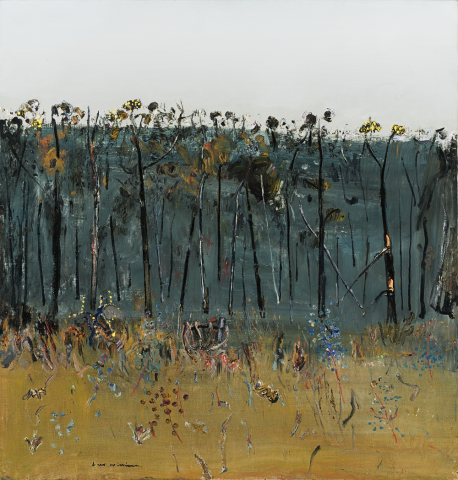ACACIA SAPLINGS, c.1974
FRED WILLIAMS
oil on canvas
105.5 x 101.5 cm
signed lower left: Fred Williams
Rudy Komon Gallery, Sydney
Private collection, Sydney
Geoff K. Gray, Sydney, 3 March 1986, lot 111
Private collection, Sydney
Philip Bacon Galleries, Brisbane
Private collection, Brisbane
Deutscher~Menzies, Sydney, 15 June 2005, lot 25
Private collection, Sydney
The brilliance of golden wattle midst the grey-green of the winter landscape is one of the marvels of the Australian bush. In July 1969 Fred Williams, John Olsen and Clifton Pugh were painting en plein air at Pugh’s place of Dunmoochin, near Cottlesbridge away from Melbourne. Olsen, seeking renewal through the landscape, produced Wattle and Moon, 1969 one of his outstanding works of the time. Williams was inspired to write in his diary that it was ‘fascinating painting the wattles’, his interest being so aroused that he added later, ‘I would really like to work from them as they mature’.1 It took several years to do so. Returning to Cottlesbridge in the winter of 1974 and selecting an area near to Pugh’s place, he noted, ‘It was a superb spot and a delight to paint the Wattles in their nat[ural] surrounds’.2 Wattle began to feature in a series of paintings completed over the following years, their range of yellows suited to the new and wider palette he was now using. Outstanding examples include the three related paintings Acacias I, II and III, 1974, Landscape with Acacias – Diptych, 1974, and the Botanist’s Garden, 1975, which James Mollison called a ‘riot of colour’.3 The wattles near Pugh’s place continued to fascinate Williams. In August 1976, he twice visited nearby St. Andrews to paint them at their golden height. The very painterly Blackwood Wattle dates from this time.
Acacia Saplings, c.1974, full of painterly luxuriance and vitality, captures perfectly Williams’s fascination. Moreover, wattle as a harbinger of spring and regeneration coincided with Williams’s own creative developments, especially the use of a more diverse and richer palette. Acacia Saplings is conceived in three compositional bands. The lighter foreground is animated by an array of lines, curves and swirls of paint, of reds, greens, blacks, purples and mauves. Each is of exquisite hue revealing Williams as a consummate colourist. Richly textured, their three-dimensional character adding to the lively picture surface. Above this rise the black, slender trunked young acacias crowned with their yellow blossoms so cleverly outlined above the horizon. Below, the tangle of trees is set across a field of dark blue-greens evoking illusions of depth and visual enticement. All this pictorial complexity is finally surmounted by a contrasting breadth of relative flatness for the sky, its seeming simplicity veiling an intrigue of colour in harmony with the mastery of this absorbing painting.
1. Fred Williams, Diary, 24 July 1969, quoted in Mollison, J., A Singular Vision: The Art of Fred Williams, Australian National Gallery, Canberra, and Oxford University Press, Melbourne, 1989, p. 174
2. Ibid, 24 July 1974, p. 175
3. Ibid, p. 178
DAVID THOMAS
